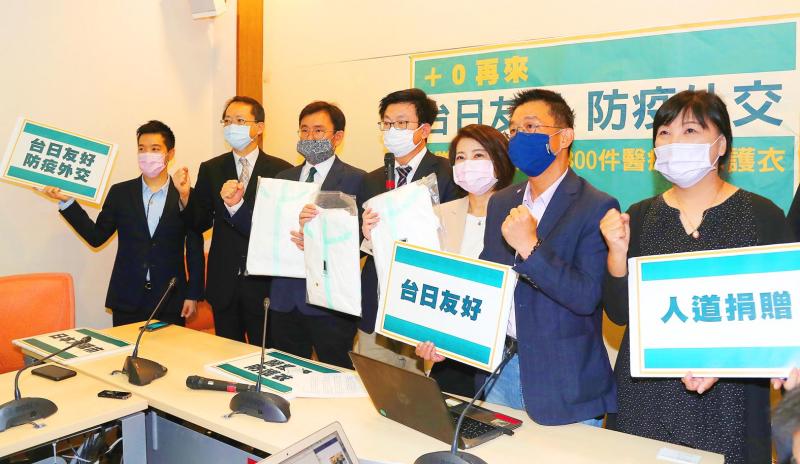A group of Democratic Progressive Party (DPP) legislators have donated 2,300 protective medical gowns to Osaka, Japan, to aid in its efforts to contain COVID-19, DPP Legislator Kuo Kuo-wen (郭國文) said yesterday.
The gowns were airfreighted on Monday and should be received by the Osaka government in the next two days, Kuo, head of an East Asia parliamentary friendship group, told a news conference in Taipei that was also attended by Japan-Taiwan Exchange Association Deputy Representative Nishiumi Shigehiro.
Demand in Taiwan for such gowns has been limited, as this nation has not had a community-level outbreak of the virus, while Osaka is in urgent need of them, Kuo said.

Photo: CNA
DPP Legislator Chou Chun-mi (周春米) said Taiwan has achieved a lot in its fight against COVID-19, and is willing to lend a helping hand to others.
The lawmakers also linked the donation to the government’s desire for Taiwan to become a member of the WHO.
Japan has expressed public support for Taiwan to participate in the WHO, which is why he supported sending the gowns to Japan to help deepen relations, DPP Legislator Huang Kuo-shu (黃國書) said.
Shigehiro thanked the group for their assistance, and expressed gratitude on behalf of the Japanese government for the donation.
Japan has reported 13,614 cases and 385 deaths. A total of 1,521 cases of those have been in Osaka, which has had 29 deaths.
In related news, in an opinion piece published in two Philippine newspapers on Monday, Representative to the Philippines Michael Hsu (徐佩勇) said Taiwan provides a model for successfully controlling COVID-19 without a lockdown, as his host nation prepares for a phased reopening of its economy this week.
In the piece published in the Philippine Star and Malaya Business Insight, Hsu detailed the public health and economic challenges the pandemic has posed to the international community, noting that Philippine President Rodrigo Duterte opted for a policy of “enhanced community quarantine” for Luzon that began on March 16 and is due to end tomorrow.
Hsu explained how the Central Epidemic Command Center was established after the SARS outbreak in 2003 to better coordinate the government’s response across departments.
Activating the center on Jan. 20 helped to quickly implement disease prevention measures, mobilize resources, trace contacts and monitor the outbreak using big data analysis, Hsu said.
Other significant factors have been the center’s daily news conferences and the nation’s healthcare system, he wrote.
He also reiterated the government’s call for Taiwan to be admitted into the WHO: “Let bayanihan spirit shine and include Taiwan in the WHO to achieve ‘Health for All,’” Hsu wrote, using a Philippine word for “cooperative undertaking.”

Taiwan has received more than US$70 million in royalties as of the end of last year from developing the F-16V jet as countries worldwide purchase or upgrade to this popular model, government and military officials said on Saturday. Taiwan funded the development of the F-16V jet and ended up the sole investor as other countries withdrew from the program. Now the F-16V is increasingly popular and countries must pay Taiwan a percentage in royalties when they purchase new F-16V aircraft or upgrade older F-16 models. The next five years are expected to be the peak for these royalties, with Taiwan potentially earning

STAY IN YOUR LANE: As the US and Israel attack Iran, the ministry has warned China not to overstep by including Taiwanese citizens in its evacuation orders The Ministry of Foreign Affairs (MOFA) yesterday rebuked a statement by China’s embassy in Israel that it would evacuate Taiwanese holders of Chinese travel documents from Israel amid the latter’s escalating conflict with Iran. Tensions have risen across the Middle East in the wake of US and Israeli airstrikes on Iran beginning Saturday. China subsequently issued an evacuation notice for its citizens. In a news release, the Chinese embassy in Israel said holders of “Taiwan compatriot permits (台胞證)” issued to Taiwanese nationals by Chinese authorities for travel to China — could register for evacuation to Egypt. In Taipei, the ministry yesterday said Taiwan

Taiwan is awaiting official notification from the US regarding the status of the Agreement on Reciprocal Trade (ART) after the US Supreme Court ruled US President Donald Trump's global tariffs unconstitutional. Speaking to reporters before a legislative hearing today, Premier Cho Jung-tai (卓榮泰) said that Taiwan's negotiation team remains focused on ensuring that the bilateral trade deal remains intact despite the legal challenge to Trump's tariff policy. "The US has pledged to notify its trade partners once the subsequent administrative and legal processes are finalized, and that certainly includes Taiwan," Cho said when asked about opposition parties’ doubts that the ART was

If China chose to invade Taiwan tomorrow, it would only have to sever three undersea fiber-optic cable clusters to cause a data blackout, Jason Hsu (許毓仁), a senior fellow at the Hudson Institute and former Chinese Nationalist Party (KMT) legislator, told a US security panel yesterday. In a Taiwan contingency, cable disruption would be one of the earliest preinvasion actions and the signal that escalation had begun, he said, adding that Taiwan’s current cable repair capabilities are insufficient. The US-China Economic and Security Review Commission (USCC) yesterday held a hearing on US-China Competition Under the Sea, with Hsu speaking on